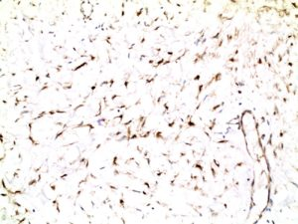Beta-catenin by IHC
Beta-catenin by IHC-12376 - Technical only, 12379 - Technical & interpretation
Beta-catenin by IHC
12376 - Technical only, 12379 - Technical & interpretation
LAB12376
LAB12379
LAB12379
- All IHC stains will include a positive control tissue
- Beta-catenin nuclear staining is seen in a very limited subset of mesenchymal tumor types, including desmoid-type fibromatosis (71% of cases), solitary fibrous tumor (40%), endometrial stromal sarcoma (40%) and synovial sarcoma (28%)
- Beta-catenin can be used to separate sclerosing mesenteritis and GIST from fibromatosis. In one study, beta-catenin detected in 9 of 10 fibromatoses, including one case associated with familial adenomatous polyposis; none of the sclerosing mesenteritis or GIST cases had nuclear catenin
- In patients with CUC, the combination of strong p53 expression and absent or weak beta catenin expression is evidence in favor of a CUC-associated polypoid dysplastic lesion in diagnostically difficult lesions
- Beta-catenin expression is seen in fibromatosis of the breast, and in the stromal component of phyllodes tumors
- Aberrant beta-catenin expression is often observed in metaplastic breast carcinomas
- Beta-catenin may be seen in high grade sarcomas, where it is thought to act as an oncoprotein with intracytoplasmic and nuclear localization with binding to nuclear DNA
Tissue
Submit a formalin-fixed, paraffin embedded tissue block
Formalin-fixed, paraffin embedded (FFPE) tissue block
Tissue section mounted on a charged, unstained slide
Ambient (preferred)
- Unlabeled/mislabeled block
- Insufficient tissue
- Slides broken beyond repair
AHL - Immunohistochemistry
Mo - Fr
1 - 2 days
Immunohistochemical staining and microscopic examination
If requested, an interpretive report will be provided
Specifications
- Beta-catenin is an intracellular protein that is regulated by the APC protein
- Mutations of either the APC gene or the beta-catenin gene can result in the nuclear accumulation of beta-catenin protein
- Fibromatoses typically have mutations in the APC/beta-catenin pathway and hence have abnormal nuclear accumulation of beta-catenin protein
Staining patterns
- Strong nuclear staining with variable cytoplasmic staining
References:
- Montgomery E et al: Beta-Catenin immunohistochemistry separates mesenteric fibromatosis from gastrointestinal stromal tumor and sclerosing mesenteritis. Am J Surg Pathol. 26(10): 1296-1301, 2002.
- Walsh et al p53 and Beta catenin expression in chronic ulcerative colitis-associated polypoid dysplasia and sporadic adenomas: an immunohistochemical study. Am J Surg Pathol. August 1999 - Volume 23 - Issue 8 - p 963.
- Geyer et al: Beta-Catenin pathway activation in breast cancer is associated with triple-negative phenotype but not with CTNNB1 mutation. Modern Pathology (2011) 24, 209-231.
- Lacroix-Triki et al: Beta-catenin/Wnt signalling pathway in fibromatosis, metaplastic carcinomas and phyllodes tumours of the breast Modern Pathology (2010) 23, 1438-1448.
- Kuhnen et al: Beta-catenin in soft tissue sarcomas: expression is related to proliferative activity in high-grade sarcomas. Mod Pathol 2000;13(9):1005-1013.
- Ng TL, Gown, A et al: Nuclear beta-catenin in mesenchymal tumors. Modern Pathology (2005) 18, 68-74.
88342 - 1st stain
88341 - each additional stain
88341 - each additional stain
05/11/2017
10/17/2018
01/12/2026
